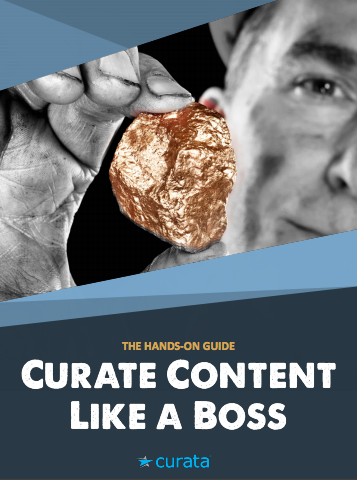- Share Content Marketing & PR: How the Hell Do They Relate? on Facebook
- Share Content Marketing & PR: How the Hell Do They Relate? on Twitter
- Share Content Marketing & PR: How the Hell Do They Relate? on Linkedin
- Share Content Marketing & PR: How the Hell Do They Relate? via email
Yes, you heard right.
How the hell does PR relate to content marketing?
Well, Gini Dietrich, founder and CEO of Arment Dietrich, an integrated marketing communications firm, helped me answer this question. I sat down to read her book, Spin Sucks, where she emphasized that spinning stories, leaving out facts, or even lying, will get you nowhere. By applying her countless tips for ethical and effective communications, you’ll be on the right path towards becoming a content marketing leader.
So as content marketers, what can we take away from a book that is primarily about public relations? Here are four lessons:
1. How to Define High-Quality Content
The age-old question among content marketers is, “What type of content will engage my audience?” Dietrich puts it in perspective when she makes us think about the following: We all hate spam, and the ‘me, me, me’ approach found on countless websites, but why when we are creating content, do we come up with these same ideas that we know we dislike?
To resolve this problem, Dietrich says there are certain questions we should ask ourselves when trying to create high-quality content. One of my favorite tips that she offers up is, “If you don’t want to bookmark it and share it, no one else will either.” It might be hard to come up with ideas that’ll reflect high-quality content, but don’t try and spin your story so you can hit the publish button faster. As she states over and over again, it’s a marathon, not a sprint.
2. The Importance of the Convergence of Media
In order to execute an integrated communications strategy and increase awareness for your company, Dietrich says that we must remember to seamlessly combine paid, earned, shared, and owned media.
She walks through each of these different channels, providing case studies, ways to measure each type, and even twenty different ideas to create shareable and valuable content. One of my favorite tips that she offers:
“The very best thing you can do is continue to create valuable and interesting owned media, integrate it with the more traditional paid and earned media, and know as much as you can about how the search engines work to help people find you.”
Search engine optimization is one of Dietrich’s main points throughout the book. Even though our created content should speak to human beings, she wants to make sure we understand that we need to speak to Google as well.
3. How to Monitor Content Scraping
Dietrich describes the practice of content scraping as publishing someone else’s content onto your website, verbatim, without adding any of your own value or insights.
In addition to Dietrich providing tips and tools you can use to monitor the “scrapers”, I recommended using content curation to avoid scraping as a whole. Content curation is an ethical alternative to scraping, and is a relevant tactic that we found best-in-class marketers are using as 25% of their content mix. Employing this type of strategy keeps writers honest and avoids repercussions of potentially unethical practices.
4. Customers Control Your Brand
One of Dietrich’s biggest points throughout the book is how much the communications world is changing, and why we need to pay attention. Most importantly, customers are now in control of your brand. If a customer has a bad experience with your brand, all it takes is one tweet, or one Facebook post, and hundreds or thousands of people have now seen that story. This one experience is enough to end your relationship with that customer, and no amount of communications management can fix that person’s bad experience.
It doesn’t matter how big or well-known your brand is, because the experience you have with your customers should be consistent, all across the board whether it’s a phone call, tweet, or email. Earn the trust of your customers, build relationships with them through your content, and keep it honest, because frankly…spin sucks.
An Interview with Gini
I was fortunate to have also had the opportunity to interview Gini Dietrich. Here’s what she had to say:
What inspired you to write this book?
In September 2006, we launched a blog called Spin Sucks. We had no idea what we were doing or what content marketing meant or even how to distribute it. The social networks didn’t even exist back then. It wasn’t until 2009 that we figured out what we were doing and had a clear vision—to change the perception people have about the PR industry. Because of that, Spin Sucks (the book) had to tell a different story than most are accustomed to hearing. We’re not liars and spin doctors. That is what inspired me to write it.
What was the biggest difficulty you had when writing this book?
The writing part is always easy (relatively speaking). It’s the marketing part that isn’t so much fun. You have to pimp yourself out and I really, really hate doing that. But I will tell you, my husband and I celebrated our 10 year anniversary when I was in the middle of writing it. We went to Paris for two weeks and I had to write while on vacation because I had a big deadline the day after we returned. So I pretended I was Ernest Hemingway and wrote in sidewalk cafes. In Paris.
What is the greatest piece of marketing advice you have been given?
Be controversial!
Where do you think the future of content marketing is headed?
We are at content exhaustion right now and people are tired of all the crap out there. The content that will continue to evolve will be the kind that is informational and educational…not self-promotional. Content marketers who haven’t yet figured out content marketing isn’t another advertising channel won’t be able to keep up.
What’s the first step PR professionals should take in incorporating content marketing into their strategy?
I’m a big, big believer in practicing your craft. That might mean keeping a personal blog, writing for a passion magazine, or even writing fiction or poetry. If you practice the craft, you will be much better at it in your day job.
You talk about the importance of not spinning your message. If you could only give one tip to content marketers to tell an honest story, what would it be?
The big concern with being honest is executives feel like that is going to require giving away proprietary information. They want to be honest by omission and that’s not how it works. BUT you cannot provide intellectual capital or proprietary information. For instance, we’re a private company so we don’t share financials. That doesn’t mean we’re being dishonest. It just means that a certain part of the business isn’t for public consumption.
It can sometimes be hard to cover all avenues of paid, owned, earned, and shared media. Which channel do you think is the most important to focus on and why?
I hate this answer, but it depends. It depends on the business. For instance, if your customer is a government agency, you’re not going to get email addresses, they’re not going to be using the social networks, and there are very few publications they read that aren’t the Wall Street Journal or The New York Times. For someone like that, paid media—particularly in stadiums—is probably the best bet. For a small business that knows who it’s customers are, content marketing and some form of distribution (social media or email marketing or both) are probably the best bet.
What’s one communication tool that all marketers should be using?
The phone! I actually hate the phone because email and texting are so much more efficient, but the phone cannot be replaced for certain things.
What’s the best example you have seen of content marketing?
Oh man! That’s a tough one. There is so much good stuff out there. I really love what GE is doing with content, new social channels, and staying ahead of trends. They have a great Vine campaign—#6SecondScience—that curates user-generated videos showing the miracles of science. It’s like a science fair for grown-up nerds!
To learn more about how to write content, please download our ebook, Business Blogging Secrets Revealed.













